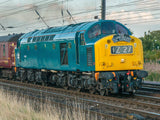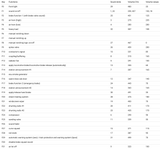Between 1958 and 1962, the British State Railways BR 200 had diesel-electric Class 40s built for heavy-duty express train service. The 16-cylinder diesel engine delivered 2000 HP and generated the energy for the six DC motors, which accelerated the 136-ton locomotive to 140 km/h. The high weight made two running axles necessary, which were combined with three driving axles to form a bogie. With the introduction of the high-speed trains in the late 1970s, the star of the Class 40 sank and so in 1985 the last of the massive locomotives retired from service. At least seven copies have been preserved.
Different starting processes can be selected with F1: 1x press button = warm start / press button 2x = false start / press button 3x = cold start
F2 slows down the locomotive slowly.
F5 enables the heavy load mode: The diesel notch is always one up compared with normal operation. If you want to jump two notches, simply set CV 104 to 150 (instead of 130).
F8 turns on the manual ntoching. Once F8 is on, you can use F7 to notch up and F6 to notch down. F8, F6, and F7 must be turned off to return to normal mode. If F8 is off and you press F7, the prime mover will run to full speed.
F14, F18 and CV 170 value 0 or 1, can switch between a "normal announcement" or an announcement "with gong".
F9 can increase the speed of the spirax valve by double-clicking it. The speed levels are slow, medium and fast.
17 will bring the locomotive to full stop.
F21 and CV 168 = value 0 or 1, can switch between a "normal" or a "squeaking" wiper.
F28 and CV 164 = Value 0, 1, 2 or 3, can switch between different rail joints (three coupler can be activated with CV 165 = value 1).
F29 and CV 169 = value 0 or 1, can switch between the "Automatic Warning System (AWS)" or the "Train Protection and Warning System (TPWS)".




